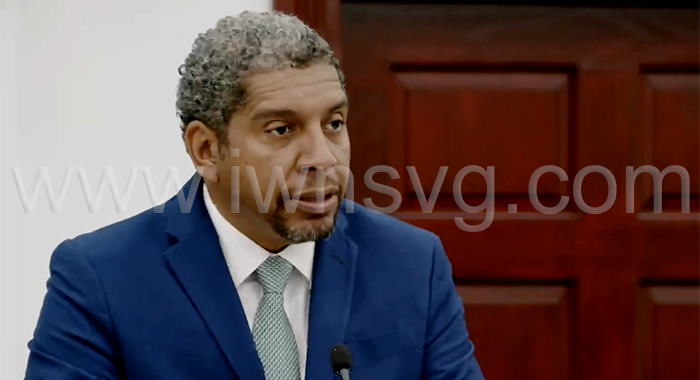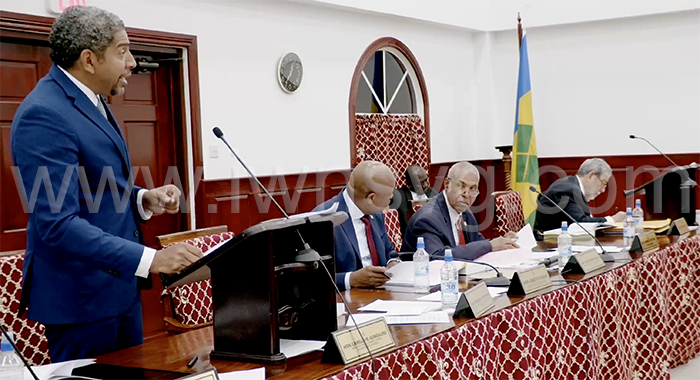Minister of Finance Camillo Gonsalves is asking Parliament to approve Estimates of Revenue and Expenditure for 2024 amounting to ECEC$1,616,496,574 and pave the way for the presentation of the Budget on Jan. 8, 2024.
The figure represents an 11.8% increase over the approved budget for 2023 and is made up of recurrent expenditure, inclusive of amortisation and sinking fund contributions, of EC$1,045,983,963 and capital expenditure of EC$570,512,611.
The fiscal package is to be financed by current revenue of EC$810,855,820 and capital receipts of EC$805,640,573.
Opposition Leader Godwin Friday is slated to respond to the numbers when the sitting of the national assembly resumes later today (Tuesday).
“… these estimates, as dry as those numbers are, encapsulate one of the most active, ambitious and creative developmental programmes ever seen in St. Vincent and the Grenadines,” Gonsalves told lawmakers after outlining the figures.
“This year, in 2023, we spent more money than we’ve ever spent before on projects and that number is going to be in excess of EC$350 million this year that we’re spending,” he said, adding that EC$570 million is budgeted for 2024.
“It’s ambitious. But we’ve taken a lot of time to try to get our ducks in a row to drive some very important developments in this country: schools, roads, hospitals, cultural and creative hubs, healthcare facilities, clinics and the like, sporting facilities, hospitality facilities, and not to mention the massive port facility that we believe will have a transformational impact on the country.”
The finance minister said many of the large projects will help to drive robust economic growth.
He said they are in addition to a number of important smaller projects “that will mean that we’ll have real impact and real differences on the lives of people across St. Vincent and the Grenadines in their own local communities”.
Gonsalves said the 2024 current expenditure, exclusive of amortisation and sinking fund contributions, amounts to EC$835,422,407 and current revenue is estimated at EC$810,853,820.
“Consequently, on the face of it, there is a current deficit of EC$24.6 million in these estimates,” he told Parliament but added that in the 2023 Estimates there was a projection of a current deficit of about EC$10 million.
“And our latest projections for this year indicate that far from a EC$10 million deficit on the current account, we should be realising a surplus in excess of EC$36 million,” Gonsalves said.
Current revenue of EC$810.9 million
He pointed out that the current revenue of EC$810.9 million is 6.5% or EC$49 million above the amount budgeted in 2023.
“This fairly strong projected revenue performance for 2024 is based on the projected expansion in real domestic activity of approximately 6%,” Gonsalves told Parliament.
He said that revenue from tax sources is expected to contribute EC$691.5 million to the Consolidated Fund in 2024, while non-tax revenue is estimated to gross EC$119.3 million.
Tax revenue is expected to increase by 6.7%, with Taxes on Goods and Services expected to rise by EC$30.7 million or 14.5%, taxes on international trade and transactions to increase by EC$13.1 million or 6.1% and taxes on property to go up by 2.6% or EC$1.4 million.
Non-tax revenue collection for 2024 is estimated at EC$119.3 million — 5.4% more than the amount budgeted in 2023.
“The amount in the 2024 budget on the non-tax revenue is expected to come mainly from sales of goods and services, which is projected to generate $98.8 million in revenue,” Gonsalves said, and noted that the amount is estimated to be EC$3 million more than the amount budgeted in 2023.
Revenue from non-tax sources is also expected to come from inflows and other miscellaneous sources amounting to EC$13.6 million.

recurrent expenditure — EC$1.04 billion
Meanwhile, the total estimated recurrent expenditure inclusive of amortisation and sinking fund contributions is estimated at EC$1.04 billion — 7.4% or EC$71.7 million above the amount budgeted last year.
The recurrent expenditure for 2024 is made up of current expenditure of EC$835.4 million; amortisation of EC$188.6 million and sinking fund contributions of EC$22 million for a total of EC$1.045 billion.
The finance minister told Parliament that current expenditure is expected to increase by 8.3%, amortisation will fall by 4.4% and sinking fund contributions will remain flat.
Under current expenditure, compensation of employees will increase by 4% or EC$15 million and other transfers, which includes social assistance, training grants and contributions to local regional and international organizations, will go up by about EC$9 million or 6.1%.
He said compensation of employees will amount to EC$388.8 million, pensions EC$70 million, other transfers EC$156.6 million; debt service EC$317.7 million and goods and services EC$112.8 million for the total of EC$1.045 billion.
Gonsalves said that in the 2024 budget, compensation of employees, which adds up to EC$388.8 million, is comprised of salaries of EC$315.5 million, allowances of EC$28.8 million, wages of EC$29.4 million and employers National Insurance Services (NIS) contribution of EC$15.1 million.
The 2024 budget for wages and salaries is 4.2% higher than the amount estimated in the wage bill in 2023.
The main reason for the increase in the wage bill is the 2% salary increase for public servants that the government agreed with public sector unions last year.
The finance minister said that lifting the personal income tax ceiling from to ECEC$3,000 a month, as the prime minister announced in his Independence Address on Oct. 27, will impact government revenue.
The third reason relates to the increases in increments and the additional allowances that go with a number of the new positions that have been created.
Pension reform announcements in budget
The finance minister said the 2024 budget provides EC$85.1 million to pay pensions to retired civil servants and the government’s counterpart contribution to the NIS for civil service currently employed.
Of that amount, EC$70 million is for pensions and EC$15.1 million for NIS contributions.
“Pensions will continue to be one of the more significant items in the recurrent expenditure and the government … has committed to announcing in the January budget speech, the contours of the proposed amendments to our NIS and pension arrangements,” Gonsalves said.
He said that while the government is “still consulting up to the last minute, we will make some additional announcements in that regard in the coming weeks.”
Gonsalves said that transfer payments to local regional and international organisations and individuals, which is estimated at EC$156.6 million, represents an increase of 6.1% when compared to the budget of 2023.
This is made up of grants and contributions of EC$108.5 million, training EC$24.2 million and social assistance of EC$23.9 million.
The budget for the expenditure on goods and services in 2024 is EC$112.8 million — a 2.9% increase in this category of expenditure.
Government operating expenses will increase by 11.9%, reflecting rising operational costs of most ministries and departments as a result of inflationary pressures, mostly related to fuel energy and other material costs.
“And utilities an increase of about 1.7% again related to the high costs of utilities in the current environment. Other notable items of expenditure under this category include maintenance expenses and professional and consultancy expenses,” Gonsalves said.
He said that the public debt as at Sept. 30, was EC$2,444,470,403, an increase of 12.8% year on year.
The finance minister said the recurrent budget is concentrated in four main functional areas which account for 80% of the recurrent estimates.
General public services total EC$414 million or 42%; education accounts for 16.6% or EC$173.4 million; economic affairs gets EC$116.4 million or 11.1% and social protection is allocated 10.2% or EC$107 million.
“Other important strategic priorities of the government are health and public order and safety, where 9.2% and 8.2% of the budget have been allocated respectfully,” Gonsalves said.
Capital estimates 21% higher
The 2024 capital estimates of EC$570.5 million represents a 21% or EC$99 million increase year on year.
Four ministries will account for 79.8% or EC$455 million of the capital estimates for 2024, namely, Finance and Economic Planning — EC$196.3 million; Urban Development — EC$115.4 million; Transport and Works — EC$106.9 million; and of Tourism, Civil Aviation, etc. — EC$37 million.
He said that 78.9% or EC$450 million of the capital budget is accounted for by four of the nine functional heads.
Economic Affairs receives 50% of the capital budget, with an investment program estimated at EC$287.5 million intended to provide the basis for growth in the main productive sectors of the economy.
Environmental Protection has been provided with EC$82.4 million or 14% of the capital budget, “mainly to continue the government’s impressive resilience building campaign”.
Gonsalves said that in 2024, Recreation and Culture will displace Health as the third largest functional sector, having been provided with EC$42 million or 7.4% of the capital budget to further enhance the quality of physical infrastructure and equipment in various communities.
Housing receives EC$37.9 million, or 6.7% to provide housing assistance to vulnerable individuals and families across St. Vincent and the Grenadines.






